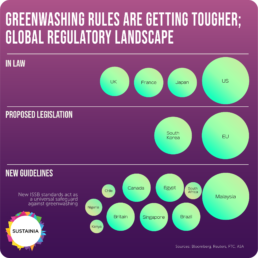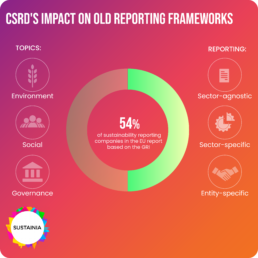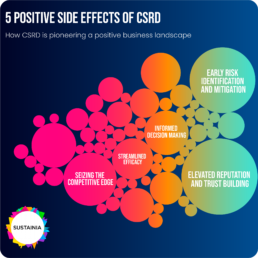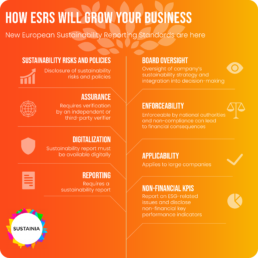Sustainia Simplifies
Greenwashing - What You Need to Know, Today

Emerging Trends in Greenwashing: What Corporations Must Know
“Sins, like chickens, come home to roost.” – Charles W. Chesnutt.
In today’s corporate landscape, greenwashing has emerged as a metaphorical sin. The deceptive practice of portraying a company or its products as environmentally friendly when they fall short of such claims has garnered significant attention. As stakeholders become more conscious of sustainability and demand greater transparency, the crackdown on greenwashing is intensifying worldwide. This article sheds light on greenwashing, global efforts to tackle it, and emerging trends and provides actionable steps for businesses to mitigate risks and uphold transparency.
Understanding Greenwashing
Greenwashing involves presenting misleading or false environmental claims to consumers and stakeholders. To illustrate this concept, let’s consider a practical example. A garment manufacturing company labels its products as “sustainable” or “eco-friendly” without concrete evidence to support these claims. While the company’s intention may be to attract environmentally conscious consumers, the absence of transparent and credible sustainability practices classifies such claims as greenwashing.
Trends: Greenwashing and Lawsuits
In recent times, corporations, especially airlines, have faced legal challenges related to false greenwashing claims. In Europe, a Dutch court allowed a civil suit against KLM in June 2023. The lawsuit contends that the airline’s commercials misled consumers about its environmental credentials. Similarly, more than 20 European consumer organizations have also filed complaints against 17 airlines, urging action against misleading greenwashing claims. In the United States, Delta Airlines is facing a lawsuit filed in May 2023 in California, questioning the effectiveness of carbon offsets and alleging misleading claims of carbon neutrality. These examples demonstrate the relentless pursuit of consumers, shareholders, and public interest organizations in holding corporations accountable. It is crucial to note that while airlines face heavy scrutiny due to their significant carbon emissions, greenwashing concerns extend to corporations across various industries. This is evidenced by two greenwashing lawsuits filed against garment manufacturer H&M in 2022.
Tackling Greenwashing
Regulatory bodies, industry initiatives, and consumer protection laws have been established to combat greenwashing. For example, in the Europe Union, the Corporate Sustainability Reporting Directive (CSRD) will soon mandate approximately 49,000 companies to report on a wide range of sustainability issues. Furthermore, the proposed European Union “Green Claims Directive” aims to address greenwashing by introducing stringent requirements to tackle false environmental claims. The primary law regulating greenwashing in the United States is the Federal Trade Commission Act (FTC Act), which prohibits “unfair or deceptive acts or practices in commerce.” The FTC has also issued guidelines on environmental marketing, known as “the Green Guides,” which provides businesses with recommendations on how to make truthful and non-deceptive environmental claims. In June 2023, The UK Advertising Standards Authority (ASA) published new Guidance on environmental and social responsibility advertising claims. The Guidance emphasizes the need for clear and complete claims, addresses misleading carbon-neutral and net-zero claims, and highlights the importance of considering the entire product lifecycle in environmental advertising. By providing these clarifications, the ASA aims to combat greenwashing in marketing and advertising campaigns in the United Kingdom.
Additionally, frameworks like the Task Force on Climate-Related Financial Disclosures (TCFD), the International Sustainability Standards Board (ISSB), and the Global Reporting Initiative (GRI) guide companies in voluntarily disclosing their environmental, social, and governance (ESG) performance. These regulatory measures emphasize the need for corporations to stay aware of their evolving duties and obligations, either as a function of consumer protection or environmental protection.
The Way Forward
To navigate the greenwashing landscape effectively, corporations must adopt a proactive approach as follows:
a) Compliance with ESG, climate, and consumer protection laws, regulations, and frameworks is essential. Cutting corners will only lead to disastrous consequences in the long run.
b) Corporations must practice what they preach. Making bold ESG claims while engaging in practices that contradict sustainability objectives will damage consumer trust and reputation.
c) Evidence-based data is vital. The accuracy, quality, and quantity of data should not be compromised. Third-party verification enhances trust and transparency, enabling stakeholders to rely on available information safely.
d) Clear and comprehensive communication of sustainability information is crucial. Timely releases containing all relevant information empower stakeholders, including consumers, to make well-informed choices.
Is greenblushing an option?
Corporations should balance being overly aggressive and passive to navigate the greenwashing landscape effectively. In this context, a phenomenon known as “green blushing” arises. Green blushing describes the phenomenon where companies opt to stay silent about their positive impact due to concerns about being labeled green washers or the pressure to attain absolute perfection. While this approach may seem cautious, it raises sustainability compliance concerns and presents a problem for stakeholders, including consumers, who must make well-informed company choices.
Green blushing reinforces the perception of being non-transparent and untrustworthy. Moreover, it does not reduce the risk of lawsuits but aggravates it. Succumbing to green blushing is not advisable, as it paints corporations as unserious, lacking transparency, and untrustworthy. In this era of mandatory reporting provisions, especially in Europe, green blushing is simply not an option.
In a world increasingly focused on sustainability, the consequences of greenwashing for corporations are significant. To combat greenwashing effectively, businesses must adhere to ESG regulations, align their actions with their sustainability claims, and provide accurate and verifiable data. Clear and comprehensive communication of sustainability information is vital to avoiding greenwashing and the counterproductive approach of green blushing. By embracing genuine commitment and transparency, corporations can build trust, mitigate risks, and contribute to a more sustainable future for all.



